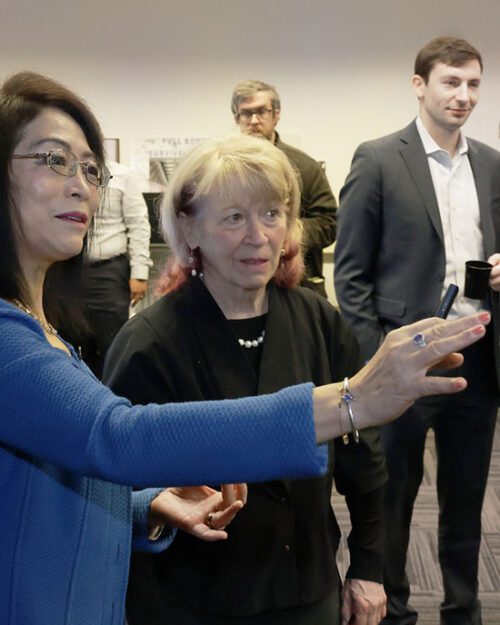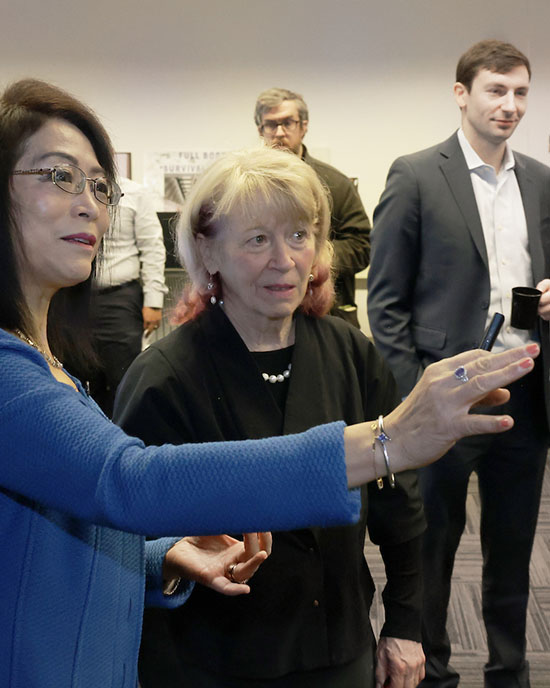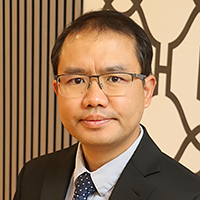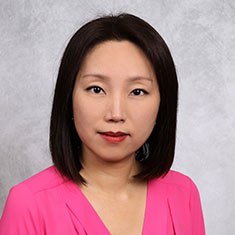PNW Pridecast: CIVS Impresses Department of Energy visitors

Chenn Zhou, NIPSCO Distinguished Professor of Engineering Simulation and founding director of CIVS, demonstrates simulation technology to Geri Richmond, U.S. Department of Energy Under Secretary for Science and Innovation.
Listen to the Episode
Episode Script

Chenn Zhou, NIPSCO Distinguished Professor of Engineering Simulation and founding director of CIVS, demonstrates simulation technology to Geri Richmond, U.S. Department of Energy Under Secretary for Science and Innovation.
Welcome back, Purdue Northwest colleagues!
You’re in the right place to listen to another installment of Pridecast, PNW’s internal faculty and staff podcast.
I’m your host, Kale Wilk, and for this episode we’ll share updates on new directions for CIVS researchers; innovative Computer Science research on gunshot detection technology; and how the STARS Computing Corps is boosting representation in computing disciplines.
Department of Energy Under Secretary Richmond Wowed During CIVS Visit
In celebration of several recent multimillion dollar research grants to CIVS from the DOE’s Office of Renewable Energy and Efficiency, Richmond and Mrvan listened to presentations during their tour that emphasized the far-reaching impacts CIVS projects serve for industrial innovation, decarbonization, digital transformation, workforce development and community and industry relations.
Under Secretary Richmond was enthusiastically complimentary of the work being performed by CIVS researchers and students. Taking a chance to demo visualizations with CIVS’ 3D goggle apparatuses, she was able to be immersed in multilayered simulations of industrial spaces. Here’s a brief selection of Richmond’s remarks:
“I have read about the things CIVS and this institution are doing, and now I am even more impressed,” said Richmond. “My story to take home to the Department of Energy is that it should be proud, and I am very proud to see what you are doing. It is so cool how my brain can go right in the middle of a blast furnace when you are simulating hydrogen and to see what the energy flow would look like.
“If you do not do things like CIVS does to simulate what happens under different conditions, you have to go to the lab and try over and over again. What CIVS has developed is a simulation system, artificial intelligence and machine learning to simulate what can happen, as well as go back and validate the research. I have done a lot of simulations in my own research, but nothing to this level.”
I have read about the things CIVS and this institution are doing, and now I am even more impressed. My story to take home to the Department of Energy is that it should be proud...
In the last three years, CIVS has been the lead organization for three large grants, with a total of $24 million dollars funded by the DOE. These include a recent $7.1 million grant that will specifically support research on steel decarbonization of a steelmaking electric arc furnace through alternative injectants and electromagnetic stirring technology; a $10 million grant for development and demonstration of an industrial hydrogen-fired steel reheating furnace in October 2023; 3) and a $7 million DOE grant for integrated virtual blast furnace for real-time energy efficiency improvement in 2021.
CIVS, representing Purdue Northwest and the Purdue system, is also a principal partner in the $1 billion Mach H2 Hydrogen Hub.
Here are some additional remarks from Congressman Mrvan:
“When we talk about decarbonization, we talk about the ability of our steel industry to thrive, we talk about renewable and cleaner energy, and we talk about the Purdue Northwest students and CIVS lab being an example for the world to see,” said Mrvan. “When we bring resources back to Northwest Indiana and Purdue Northwest, they are well-spent. We have the industry, workforce and education to bring everyone together in order to make a greater product and show the world we can do it.”
For more information, visit pnw.edu/civs.
Computer Science Researchers Develop AI-Powered Gunshot Detection Technology
A group of student and faculty researchers from PNW’s department of Computer Science have researched and successfully tested a gunshot detection system that leverages burgeoning artificial intelligence (AI) technology.
Wei (David) Dai, assistant professor of Computer Science and director of the Advanced Intelligence Software Lab, has been interested in the practical application of AI with public safety initiatives since he began his own doctoral research. With the help of four student research assistants and collaboration with the PNW Police Department, the group developed and successfully tested the Gunshot Detection System apparatus through several trials.
The research team began by training the AI program to recognize gunshot sounds at a firearms shooting range. The team also taught the program to identify other loud noises, such as a popping balloon or a firework, in order to differentiate the sounds. By understanding how to contrast these noises, the program can accurately identify true gunshots and relay data to first responders within seconds to alert them to a potential active shooter.
Our school is doing applied research and technology with artificial intelligence for social good. We want positive impacts. It is more than a paper or patents.
The research team furthermore trained the AI program to recognize the locations of gunshots inside large, multistory buildings. Partnering with the PNW Police, researchers tested blank ammunition for the AI to recognize. The program had nearly perfect accuracy on recognition of the first gunshot, followed by 100% accuracy in recognizing a second gunshot in each trial. The program also pinpointed which floor location the gunshots came from.
The Gunshot Detection System’s research purpose is ultimately intended to help reduce law enforcement officials’ response time because of the average delay in humans’ recognition of gunshots. While examining several case studies for its project, the research team found five minutes was the approximate time it took for someone to recognize gunshots from a potential active shooter and call 911. This newly tested technology may help pave the way for improving safety on school campuses and reducing response times to incidents involving gun violence.
Here’s Dai with more:
“Our school is doing applied research and technology with artificial intelligence for social good,” said Dai. “We want positive impacts. It is more than a paper or patents.”
For more information, visit pnw.edu/computer-science.
STARS Computing Corps Aims to Increase Diverse Representation in Computing Disciplines
The Computer Science department is also proud to support a chapter of the STARS Computing Corps student organization on campus.
Now in its second academic year, PNW’s STARS Computing Corps chapter aims to increase diversity and participation in computing disciplines for historically underrepresented students, which include women, students of color, and first-generation students.
STARS Computing Corps is an initiative sponsored by the National Science Foundation. The nationwide effort is intended to promote participation, persistence and career advancement in computing disciplines for undergraduate and graduate students, as well as university faculty members. To help continue developing a supportive culture at PNW for these students, Grace Yang, department chair of Computer Science, submitted a departmental Broadening Participation in Computing plan to NSF detailing how PNW would contribute to a discipline-wide mission for supporting diversity in computing. Grant funding from the national STARS Computing Corps body and the Indiana Academy of Science additionally supports the PNW chapter’s activities, such as a peer-mentoring program.
We want to do things to help our efforts to broaden participation in computing and help them succeed.
Yang aims to take Computer Science students annually to the Tapia Conference. The conference is produced by the National Center for Minorities and People with Disabilities in Information Technology, offering training sessions, workshops, research presentation opportunities and connections with academic and industry leaders. For the past two years, PNW Computer Science students have attended the conference thanks to sponsorship from the STARS Corps.
Here’s Yang with more:
“I wanted to do something to attract more students, including female students and students from other underrepresented groups,” said Yang. “We are also on our way to becoming an HSI, so we are making an effort to recruit students from underrepresented groups into higher education. It’s not only the department’s efforts, but also the student organization’s activities. We want to do things to help our efforts to broaden participation in computing and help them succeed.”
For more information, visit pnw.edu/computer-science.
Recent News Items
Finally, we’ll list a few recent campus news items:
- A big “congratulations” goes out to PNW’s ACHA DI men’s ice hockey team, which achieved its first-ever Great Lakes Collegiate Hockey League championship on Feb. 17. The Pride defeated conference rival Adrian in the GLCHL title game 5-3. With the win, the Pride earned an automatic birth to the ACHA DI National Tournament, also for the first time in program history.
The Pride will face #22 seed Indiana-Pennsylvania in the first round at 1:30 p.m. on March 7 at Centene Community Ice Center in St. Louis, Missouri. Tournament matches will be broadcasted on FloHockey, part of the FloSports network, and will require a paid subscription for service. Visit pnwathletics.com for more information.
- Show your PNW Pride by voting for Purdue Northwest as the best college and university in the region in The Times of Northwest Indiana’s “Best of the Region” 2024 contest. You can vote for PNW by texting 886 to 219-271-8471. Or, click the link in this script to access PNW’s site on the ballot. You can vote once per day from any digital device. Voting is open through March 24.
- PNW’s online RN-to-BSN program, offered through the College of Nursing, ranked 47 nationally among Best Online Bachelor’s Programs in U.S. News and World Report’s 2024 annual Best Online Program rankings. The program offers busy nursing professionals an accelerated and convenient degree option to earn additional skills and credentials to advance their careers.
The college’s online Master of Science in Nursing (MSN) continued to move up the rankings among Best Online Master’s in Nursing programs. PNW’s online MSN allows students to craft their learning plans alongside their work schedules, including the option to complete their practicum hours where they work.
- Chuck DeCastro, lecturer of Computer Information Technology, was recently recognized as a recipient of the Academia Instructor Circle of Excellence award from the EC-Council, an organization that promotes cybersecurity training and certification programs, as well as educational access to cybersecurity training for K-12 and college students. PNW has partnered with the EC-Council since 2019. DeCastro, as well as Michael Tu, professor of Computer Information Technology, have taught a Certified Ethical Hacker course through the EC-Council for the past three years.
- Submissions are open for PNW’s 2024 Days of Discovery. Students and faculty are encouraged to come together to celebrate research, scholarship and creative activities on April 18 in Alumni Hall on PNW’s Hammond campus. Registration is open through March 26 and can be completed at edu/discover.
That’s all for this Pridecast episode! We encourage anyone to listen to past episodes and share your faculty and staff news by visiting pnw.edu/pridecast.
I’m Kale Wilk, signing off for now, and we’ll reconnect with you in a few weeks.

